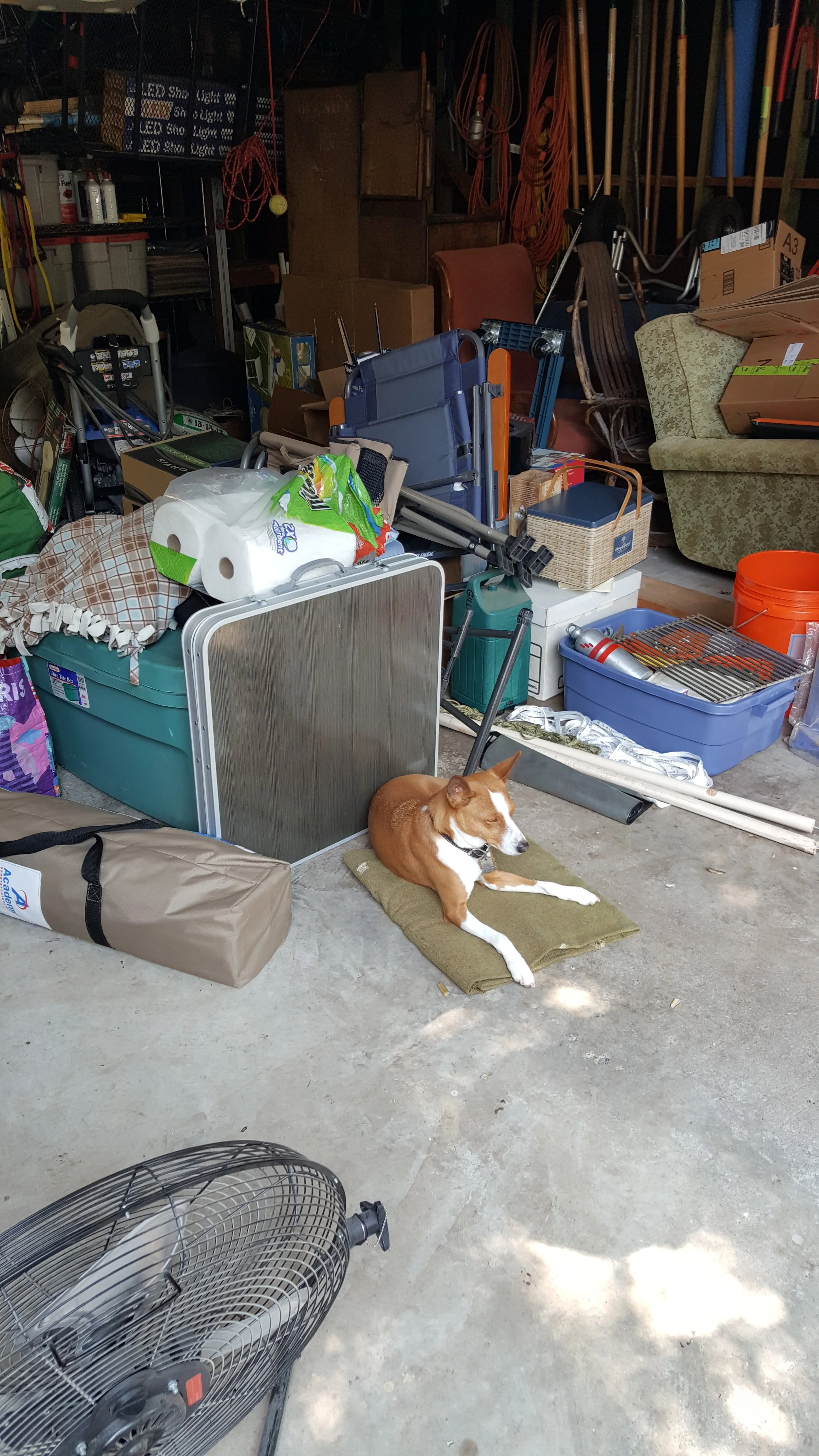When Foundations Shake
If this article doesn’t display properly on your device, click here to read from my website
"Fire goes before him and it is very tempestuous around Him." — Psalm 50:3b
The world doesn't simply unravel. It convulses.
When circumstances collapse—the diagnosis arrives, the relationship fractures, the economy implodes—we discover that our carefully constructed foundations were never as solid as we imagined. In these moments of terrestrial upheaval, we encounter a profound theological reality: God's arrival in our chaos isn't gentle. It's seismic.
Psalm 50:3b presents us with an uncomfortable truth. The fire that precedes our God isn't decorative. It consumes. It burns away what opposes Him, including our illusions of control and our misplaced securities. This isn't the sanitized deity of Sunday spirituality. This is the consuming fire of divine presence meeting human pretense.
David understood this reality viscerally. In Psalm 18:7-15, he doesn't describe a polite divine intervention. He chronicles a cosmic disruption:
"The earth trembled and quaked, and the foundations of the mountains shook; they trembled because he was angry. Smoke rose from his nostrils; consuming fire came from his mouth, burning coals blazed out of it. He parted the heavens and came down; dark clouds were under his feet."
This isn't metaphorical flourish. This is theological precision. When God moves in our circumstances, the very foundations of our existence—those mountains we thought immovable—begin to shake. Not because God delights in our discomfort, but because His presence exposes the fragility of everything we've built apart from Him.
The Divine Disruption
We live in perpetual denial about our vulnerability. We construct elaborate scaffolding around our lives—career achievements, financial security, relationship stability, health regimens, political affiliations—and convince ourselves these constitute our foundation. Then circumstances shift, and we discover we've been building on sand.
Shuffling stuff to elsewhere—with some assistance
God's arrival changes everything because God is everything. When His presence invades our carefully managed existence, it reveals the superficiality of our securities. The fire that goes before Him doesn't discriminate between what we consider valuable and what actually matters. It consumes whatever stands in opposition to His purposes, including our cherished misconceptions about self-sufficiency.
This isn't cruelty. This is mercy. The divine disruption serves redemptive purposes. God doesn't shake our foundations to harm us but to relocate us onto the only foundation that cannot be shaken: Himself.
David continues his description in Psalm 18: "He mounted the cherubim and flew; he soared on the wings of the wind. He made darkness his covering, his canopy around him—the dark rain clouds of the sky."
Notice the paradox. God arrives in darkness and light simultaneously. The same presence that brings consuming fire also brings covering. The divine disruption that exposes our vulnerabilities also provides divine protection. This isn't contradiction; it's the complexity of grace operating in a fallen world.
The Fire of Purification
The fire that goes before God serves a specific function: it consumes His foes. But who are these foes? In our personal experience, God's enemies aren't necessarily external threats. Often, they're internal—the pride that insists on independence, the fear that demands control, the unbelief that questions His character, the self-reliance that substitutes human effort for divine provision.
When circumstances force us to our knees, God's consuming fire often burns away these internal adversaries first. The financial crisis that exposes our trust in money rather than God. The health scare that reveals our faith in physical vitality rather than eternal security. The relationship conflict that uncovers our dependence on human approval rather than divine acceptance.
This purification process feels destructive because it is destructive—to everything that competes with God for primacy in our lives. But destruction serves construction when God is the architect. He burns away the flammable to reveal the fireproof. He shakes down the temporary to expose the permanent.
David experienced this firsthand. His psalms chronicle not just external deliverance from enemies but internal transformation through divine encounter. The same God who parted the heavens to rescue him from Saul also parted the pretenses to rescue him from himself.
The Paradox of Divine Presence
Here's where our theology must mature beyond simplistic formulas. God's presence simultaneously comforts and disrupts, saves and judges, delivers and demands. The fire that consumes His foes is the same fire that purifies His people. The hands that shake the foundations are the same hands that provide new construction.
"From the brightness of his presence clouds advanced, with hailstones and bolts of lightning. The Lord thundered from heaven; the voice of the Most High resounded."
The brightness of His presence doesn't eliminate the storms; it transforms their meaning. The hailstones and lightning aren't evidence of divine absence but of divine engagement. When God shows up, circumstances don't necessarily improve—they become meaningful.
This distinction matters profoundly for how we interpret our difficulties. We're conditioned to measure God's involvement by the absence of problems. If life runs smoothly, God must be pleased. If circumstances turn chaotic, we must have fallen from favor, fallen from grace.
Psalm 18 challenges this superficial assessment. God's presence often increases the tumult and turbulence because His purposes transcend our comfort. He's not interested in making our lives manageable; He's committed to making our lives meaningful. Sometimes those objectives align. Often they don't.
Living in the Fire Zone
If fire goes before our God, then following Him means living in close proximity to that consuming flame. This isn't a comfortable spirituality. It's a risky discipleship that acknowledges God's sovereign dedication to burn away whatever impedes our true heart’s desire and His purposes in our lives.
Candidly, most of us prefer a deity we can manage—one who blesses our plans rather than disrupting them, who confirms our preferences rather than challenging them, who serves our agenda rather than advancing His own. But the God revealed in Scripture isn't domesticable. His love is too fierce, His purposes too vast, His character too holy to be reduced to our categories of convenience, i.e., the patterns of the flesh and temptation toward self-establishment.
The fire that goes before Him creates a perpetual invitation to surrender. Not just surrender of our obvious sins—those are relatively easy to identify and abandon. But surrender of our acceptable alternatives to God—our good works, our theological knowledge, our ministry activities, our moral achievements, our fleshly ways as Paul describes them. Sin can be both good and evil. It’s not the activity, per se, it’s the motive against which we contend. Are we relying upon the Spirit or are we living independent of our heavenly Father? Even good works become idolatrous when they substitute for relationship with the living God.
David understood this. His deliverance came not through religious performance but through divine intervention. God parted the heavens not because David deserved rescue but because God chose to rescue. The consuming fire of God’s mercy cleared the path for His grace to advance.
The Foundation That Cannot Shake
After the earthquake, after the fire, after the consuming judgment of everything that opposes God's purposes, what remains? The foundation that cannot be shaken: God Himself. Christ alone!
"He reached down from on high and took hold of me; he drew me out of deep waters. He rescued me from my powerful enemy, from my foes, who were too strong for me."
Notice the progression. First the cosmic disruption, then the personal deliverance. God doesn't calm the storm around David; He reaches through the storm to David. The same hands that shake the mountains are tender enough to lift one drowning man from deep waters.
This is grace operating in the fire zone. God's consuming presence doesn't destroy us because we belong to Him. We may lose everything we thought we needed, but we discover everything we actually need was always available in Him. The battle between heaven and earth, tumult and tranquility, the flesh and spirit does not transpire on a field of flowers but upon a field of fractured, fleshly confidence revealed by earthquake, fire, and tempest.
The fire goes before Him, but mercy follows after. The flames consume His foes, including our fleshly foes, but His love preserves His people. In the end, we stand not on the ashes of what was burned but on the foundation of what cannot burn: His faithfulness, His character, His covenant promises, His unshakeable kingdom.
Embracing the Disruption
The question isn't whether God will disrupt our carefully managed existence, our fleshly reliances. If we're serious about following Him, disruption is inevitable. The question is whether we'll embrace the disruption as divine mercy rather than resenting it as divine interruption.
When the foundations shake, when the fire consumes our false securities, when the brightness of His presence exposes our pretenses, we have a choice. We can rage against the disruption, desperately trying to rebuild what God is tearing down. Or we can trust the process, believing that what He burns away was keeping us from what He wants to give us.
The God who parts the heavens to come down is the same God who parts our fleshly resistance to come in. He doesn't arrive to destroy us but to deliver us—from our enemies, our fears, our illusions, and most importantly, from our fleshly pretense.
Fire goes before Him, but we follow after, partakers of Christ—not because we're fireproof, but because we're loved by the One who controls the flame.



